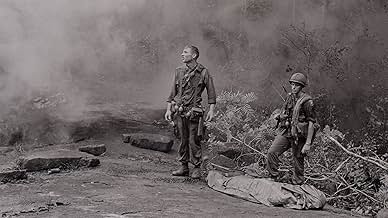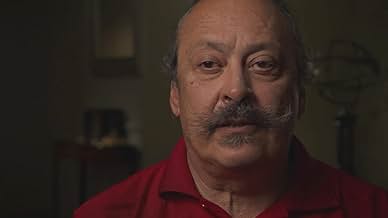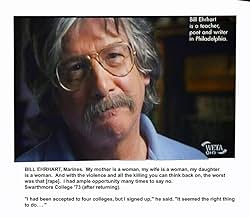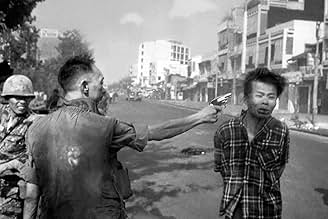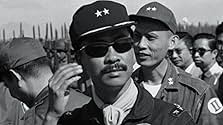Uma história abrangente do envolvimento dos Estados Unidos no conflito armado amargo que divide o sudeste asiático.Uma história abrangente do envolvimento dos Estados Unidos no conflito armado amargo que divide o sudeste asiático.Uma história abrangente do envolvimento dos Estados Unidos no conflito armado amargo que divide o sudeste asiático.
- Indicado para 4 Primetime Emmys
- 5 vitórias e 10 indicações no total
Explorar episódios
Enredo
Você sabia?
- CuriosidadesMany of the combat footage reels shown throughout the series are not from the battle being discussed, for example, during the discussion of Saigon during the Tet Offensive, several videos filmed in the city of Hue are shown as if they are in Saigon.
- ConexõesFeatured in Ken Burns: America's Storyteller (2017)
Avaliação em destaque
Well, I thought that was an amazing documentary. I think Ken Burns does an epic and moving job covering the events from a big picture political perspective. You really get a sense of the weight of history, and the scale of tragedy, particularly how decisions made by presidents and governments set in motion forces that led to catastrophic suffering. Millions of deaths and unhealed emotional wounds. I also thought the documentary was very good at the military level, describing battles and engagements that I had never heard of, in a reasonable detail. And the music and photography was epic. Seeing those pictures of old-time American life juxtaposed with the chaos of Vietnam was so moving. I also thought the reconciliation part at the end was really beautiful.
There were three things about the documentary that I did think were weaknesses.
1. There was such a focus on the protests, and starting so early on in the series, it kind of overwhelmed the narrative in some ways. I have read that the vast majority of veterans were proud of their service in Vietnam, and did not have this tortured sense of regret and shame that you see with those interviewed in the series. Some did but not most.
(for evidence see this article - https://www.wsj.com/amp/articles/ken- burnss-vietnam-is-fair-to-the-troops-but-not-the-cause-1507324058)
2. I wonder about the conspiratorial angle of things. This documentary portrays the North Vietnamese as almost magically destined to win, as if it was inevitable, as if nothing the Americans could have done would have made any ultimate difference. I just wonder if part of the reason the Americans lost is because they weren't allowed to win. I mean, had the Americans occupied Hanoi and Haiphong Harbour, would not the North Vietnamese have been unable to prosecute the war? Surely if the Ho Chi Minh trail was permanently occupied in several places there wouldn't be the communist resupply into South Vietnam? But perhaps none of this would have been possible without China directly entering the conflict. Who knows.
3.Because the documentary is so long, and also attempts to cover the bigger historical events, I don't think it captures the day to day experience of the Vietnamese villagers that well. I mean, what made someone turn to the VietCong? What was daily life like? There is another, Vietnamese documentary "the face of the enemy" which I think does a better job of this.
Overall, a fascinating time spent watching this, and I recommend it to all with caveats.
There were three things about the documentary that I did think were weaknesses.
1. There was such a focus on the protests, and starting so early on in the series, it kind of overwhelmed the narrative in some ways. I have read that the vast majority of veterans were proud of their service in Vietnam, and did not have this tortured sense of regret and shame that you see with those interviewed in the series. Some did but not most.
(for evidence see this article - https://www.wsj.com/amp/articles/ken- burnss-vietnam-is-fair-to-the-troops-but-not-the-cause-1507324058)
2. I wonder about the conspiratorial angle of things. This documentary portrays the North Vietnamese as almost magically destined to win, as if it was inevitable, as if nothing the Americans could have done would have made any ultimate difference. I just wonder if part of the reason the Americans lost is because they weren't allowed to win. I mean, had the Americans occupied Hanoi and Haiphong Harbour, would not the North Vietnamese have been unable to prosecute the war? Surely if the Ho Chi Minh trail was permanently occupied in several places there wouldn't be the communist resupply into South Vietnam? But perhaps none of this would have been possible without China directly entering the conflict. Who knows.
3.Because the documentary is so long, and also attempts to cover the bigger historical events, I don't think it captures the day to day experience of the Vietnamese villagers that well. I mean, what made someone turn to the VietCong? What was daily life like? There is another, Vietnamese documentary "the face of the enemy" which I think does a better job of this.
Overall, a fascinating time spent watching this, and I recommend it to all with caveats.
- crwdennis-cd
- 11 de out. de 2017
- Link permanente
Principais escolhas
Faça login para avaliar e ver a lista de recomendações personalizadas
- How many seasons does The Vietnam War have?Fornecido pela Alexa
Detalhes
- Data de lançamento
- Países de origem
- Centrais de atendimento oficiais
- Idiomas
- Também conhecido como
- The Vietnam War
- Empresas de produção
- Consulte mais créditos da empresa na IMDbPro
- Tempo de duração1 hora 30 minutos
- Cor
- Proporção
- 16:9 HD
Contribua para esta página
Sugerir uma alteração ou adicionar conteúdo ausente

Principal brecha
What is the Canadian French language plot outline for A Guerra do Vietnã (2017)?
Responda

